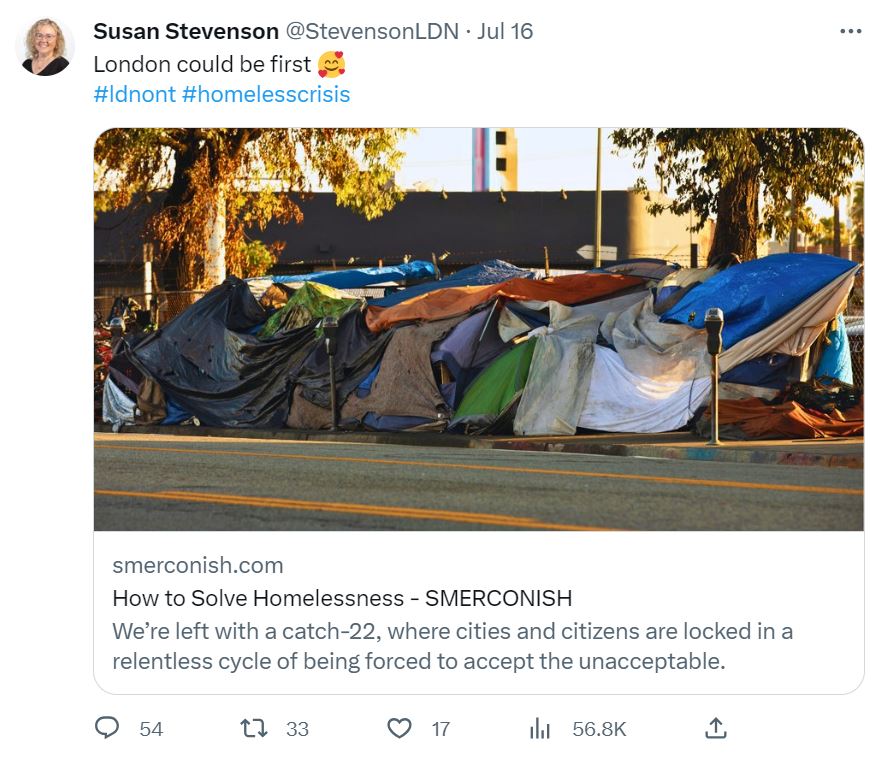A city councillor in London, Ont., is coming under fire after sharing a plan to address homelessness that suggested providing support that people need to get off the streets but arresting anyone who refuses assistance.

Ward 4 Coun. Susan Stevenson tweeted “London could be first” followed by an emoji face with hearts around it and a link to a blog post from Michael Smerconish, a political commentator in the United States.
In the post, Smerconish writes that shelter should be offered to those who live on the streets on the condition that they accept drug counseling if they are addicted, mental health services if they have mental health issues, and must work or be looking for work if able to do so.
“If they don’t do these things and return to the streets despite the availability of shelter, they can and should be arrested, for they will not be homeless. No one should be allowed to live in the public spaces of our cities,” he writes.
The online response was swift. Stevenson’s tweet was “ratioed,” meaning the number of quote tweets and comments far exceeded the number of retweets and likes, which typically suggests disagreement.
“I was inspired by the whole idea that ending homelessness, a home for everybody, counseling for whatever they need — mental health, drug addiction — finding a job and doing it at a provincial and national level and just choosing to really take care of people,” Stevenson said.
“And some people have chosen to jump on the arresting portion of it. No rational discussion about any other portion of the plan.”

Experts in the field promote a “housing first” approach, which identifies the right to housing as the first and foremost need of people experiencing homelessness.
Needs such as child care, drug addiction or medical requirements come after an individual has been housed, Leilani Farha, the global director of The Shift, an international initiative that advocates for the right to housing, previously told Global News.

Get breaking National news
Marcus Plowright, the founding chair and lead volunteer for London’s Fund for Change, agrees with Farha.
“It’s impossible to get healthy when you don’t have housing. So it has to begin with housing.”
While Stevenson said she was not expecting that her tweet would set off a “firestorm,” she suggested that a police response is sometimes warranted.
“If you’re going to offer everything and a group of people say, ‘no, we are just going to live here in the park like this.’ What are we going to do?” she said.
“We’ve got a situation where our parks and our public spaces are not accessible. They’re not safe for the public.”
Plowright says he understands public concerns about visible homelessness, noting that Stevenson’s Ward 4 is one of the most significantly impacted in the city, but he urges compassion.
“The focus seems to have been lost. The focus needs to be on the people in need and the deaths that’re happening on our streets and the misery that’s happening on our streets of our residents that simply don’t have housing.”

Referencing London’s in-progress reimagining of its response to homelessness, Plowright stressed that we should be listening to experts in the field.
“We made the conscious decision to back the Whole Of Community System Response because those are the people that have trained their whole lives and worked the front line that have come to us and said, ‘We believe this is the solution.’ Who are we to tell them any different?”
The Whole Of Community System Response centres on the creation of integrated care hubs offering access to care, health and wellness services, 24-7 safe spaces, transitional and crisis beds and more.
The plan also includes the construction of 600 high-support housing units over three years.
“We’re talking about 600 supportive housing units for the most needy in our city that are currently unhoused. If there’s, you know, arguably 1,800 on the street… those are the people that most desperately need our help,” he said.
“The only issue we should be addressing is how do we come together as a community and secure the necessary funding and expedite the building of these hubs and houses on behalf of those most disadvantaged.”
Council will be providing an update on the city’s Whole Of Community System Response next week.
The use of police in responding to homelessness has drawn increased criticism in recent years, with Toronto’s ombudsman reporting that the city chose expediency over the needs of homeless people when police in riot gear cleared encampments in September 2021.
In February 2021, police in Edmonton, Alta., apologized for the way officers forced members of the homeless community out of an LRT station during the extreme cold snap.
The arrest of a man who was homeless in July 2017 prompted an uproar on social media in London at the time, resulting in a fundraiser to secure a spot in the Fanshawe Conservation area so he could set up camp until the end of the season.
— with files from Christian D’Avino, The Canadian Press’ Tyler Griffin and Global News’ Emily Mertz and Heidi Lee









Comments
Want to discuss? Please read our Commenting Policy first.